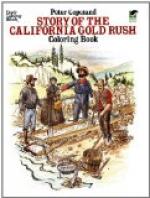About this time she remembers that her father bought her a little Indian pony, and from that happy day the child rode beside the wagon, and could keep out of the dusty trail, or ride a little way off on the prairie, if she liked. The pony carried double very well, so a small sister or brother was often lifted on behind for a ride. One night the Indians, who were always prowling round and coming as near the wagon-train as they dared, frightened the horses and got away with ten of them. All the women and children cried, Polly says, for they were afraid the redskins would come back and kill them. In the morning Polly’s father and some of the men found the Indians’ trail and tracked them to a wooded canon. The hungry thieves had killed one horse and were so busy feasting on it that the white men surprised them and shot all the Indians but two or three. The lost horses and Polly’s pony whinnied to their masters from a thicket, where they were tied, and were taken back to camp.
On and on over the great plains of Wyoming the wagons carried these emigrants. Many found the trip grow tiresome, while the oxen and mules would often lie down in their traces and refuse to go any farther. A few days’ rest, and the rich bunch-grass to crop soon set the stock all right, and the white-topped wagons crawled ahead again. Soon the emigrants saw blue, hazy mountains, far off at first, then nearer and nearer, till at last their road led through a pass between the peaks.
Then Polly remembers riding through Utah, with its queer red cliffs and high rocks carved in strange shapes by winds and weather; the stretches of sandy desert; and beyond those, grassy meadows and streams fringed with green willows. After a while Great Salt Lake lay sparkling in the sun and looking cool and blue. All around it were alkali deserts or wide plains, hot and dusty and white with salt or soda. The “prairie schooners,” with their covers faded and burnt by the sun, went very slowly over these desert wastes, Polly thought, and Nevada, with its dusty gray sage-brush land on either side of the road, seemed not much better.
“Papa’s little woman” had her hands full now; for her mother was so ill she seldom left the wagon. All the cooking fell to Polly’s share, and then she would ride along for hours with a little sister on her lap and fat brother “Bub” behind her on the saddle-blanket, so that her mother might rest and be quiet.
But soon the clear green Truckee River ran foaming and fretting beside the road, and off in the west rose the snowy peaks of the Sierra Nevada Mountains. Then the people began to laugh and to sing, for they knew that California, the land of gold, was almost in sight and that their weary journey was nearly ended.




